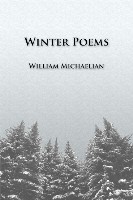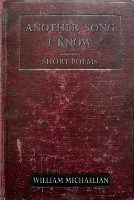A Prefix of Obscure Meaning
A whimsical poem
that might have been
a serious novel,
or the other way around
I am — though it be foolish and hopeless —
about to embark on an extraordinary adventure.
But let us save these remarks for later, shall we?
For
when all is said and done, ’tis neither here nor there
and ’twas uttered only for amusement’s sake.
Laughing I go, therefore — but wait! What was it I said?
I said, or, rather, I began by saying, I am.
This was my first mistake. And what is my second mistake?
My second mistake is admitting my first mistake.
Which is the larger, I leave for you to decide.
I am. How can I be so sure?
If the I is assumed, then the am naturally follows.
But what if the I is not I? Or not I as I understand it?
Who, or what, is doing the understanding?
And who, or what, is being understood?
Though certainly
’tis a waste of time to question one’s own existence.
Ah-ha! But if the I is in question, must not the am be also?
Not
to be a stickler for form ———— bah!
stickle away! see what I care?
but the message here is clear:
To be or not to be
is small potatoes compared to
Am I at all, and if not, then what?
What sauce for the goose. (I’ve always wanted to say that.)
Perhaps the answer is in the telephone book:
Accountants, Acupuncture, (inacupuncture; randompuncture)
Adhesives & Glues, Adjusters, Adoption Services,
Advertising Agencies, Antiques, Attorneys,
Excavating ——————— Mattresses, Mediation,
Seed & Grain Cleaning, Vending Machines, Youth Organizations.
Then again,
perhaps not.
First, and quite appropriately under the circumstances, a definition of I:
Quote
The nominative case of the pronoun of the first person; (Adam?)
the subject pronoun by which a speaker or writer denotes himself.
I is sometimes used substantively; as, Poor I must go;
in Metaph., often for the ego; as, This I that thinks is the soul.
It is sometimes used as an object pronoun, (are there amateur nouns?)
commonly so during and shortly before the 17th century,
but now only in dial. Eng., or ungrammatically.
Unquote
———— No, teacher, I is not copying. ————
Quote
A prefix of obscure meaning.
Unquote
To begin again with all sincerity
~ Chapter III ~
is a grand and noble undertaking
~ Chapter IV ~
.
~ Chapter V ~
Let us not challenge I for the moment. Let us look at am.
Is I am? Are I am? Am I what I think I is? Be I? Were I was?
And if so,
when?
Am as not, is such, when is waits while are bites her nails.
Be will then, even if only in habit and appearance he pathetically fails.
Often is, yet seldom are can be, as a lovely vision descending.
Only for the moment, then, are we is be am, or the idea worth defending.
Be I am ’til early morn. Be you is forlorn.
Be the matter are unending.
Be any are so bold me is am ’neath such vile scorn.
And here
the pressure builds
but there is no reason to worry.
The highway, or, perhaps ’tis better said, the I-way,
is such a crowded place. Everyone you meet is I — you need only ask.
But you must ask properly if you wish to be understood.
You mustn’t say,
Are you I?
No, this will surely end in argument:
“I am not you, and you are not I.”
How is it possible, then, for everyone to be I?
Such a prefix of obscure meaning!
Such an assault on the obsessive Theme of Individuality!
And not only is the highway full of I’s, (plural, not possessive)
so is the cemetery. But there, at least, the inmates are more polite:
I died in 1647.
I was born in 933.
I was quite a guy (was I).
I baked a pie, then I said good-bye.
We can live with this, though we would rather not.
We would rather skip that part altogether.
But then what would living be?
Let us think about it long and hard:
————
But surely there is more. Or is there?
Is it beyond us and our ability to comprehend,
busy as we are with bills to shuffle and a gallery of
grotesque opinions to ponder and assimilate?
Now, let us put it another way:
Without living, what would dying be?
(If you winked and said Far more efficient, then you are a lot like me.)
————
Well. I thought so.
Wink on! Wink-a-day! Be ye alive, be ye dead, ye shall have your say!
Though it accomplishes naught, it is still okay.
Thinkest thou that I am not serious?
Is that what thou thinkest?
For if it is, I would suggest you think again.
I am being as quick about this as my meager gifts allow.
And if thou thinkest that thou art ahead,
what hast ye to shew for it,
but a few bags of frozen corn,
some soap, a pair of scissors,
an ashtray full of dimes,
and a ream of untried recipes?
Here I will tell the tale of Mr. Jackrabbit and Mr. Squirrel:
Mr. Jackrabbit, said Mr. Squirrel, I beg your pardon, but you seem jumpy today.
And Mr. Jackrabbit replied, What’s wrong? Did someone steal your nuts?
Right away, Mr. Jackrabbit and Mr. Squirrel began to quarrel.
Mr. Squirrel screamed, Leave my nuts out of it!
And Mr. Jackrabbit hollered, I jump by choice and for no other reason!
Just then, a shot sounded.
Mr. Jackrabbit jumped.
Mr. Squirrel ran off and forgot all about his nuts.
The End
The day wore on. Many wars were fought.
All were lost, none were won, yet both sides claimed victory.
Which side is the greatest or the least, I leave for you to say.
If I am — which I now daresay to be the case —
if for no better reason than I have grown lazy in my old age
and my brain often misfires like a volcano — so then must be you.
Meaning that, if everyone is I, as our curious journey
down life’s highway would suggest, then we most certainly must be.
And if we be I, then logic also demands that
You are I
and
I am You.
In truth, ’tis a kind of music —
a bit awkward and out of tune, perhaps,
but let it be so.
For if naught else be recognized or achieved,
and all else crumbles and fades away,
yet will we live our days
in a glut of friendship and folly.
On the other hand — surely, you saw this coming — if I am not —
which possibility my shattered reason casually dangles in the wind,
whilst my motor skills cause me to resemble a fish out of water —
neither then must be you.
————
Oh! But I can see it in your eyes:
You are horrified!
Worse, you would have me hog-tied for my rash suggestion,
though you have never seen a hog tied,
and have only read about the ancient art at most once or twice.
To this I say,
My point exactly.
This kind of intolerance I will not stand.
I will not tolerate your intolerance.
Your intolerance is intolerable.
Furthermore, to tolerate such intolerance is intolerable,
as much so as intolerance itself.
We must speak plainly of this now
lest we grind to a messy halt.
~ Chapter XIV ~
But before we do,
shall I again tell the tale of Mr. Jackrabbit and Mr. Squirrel?
No? Very well, then. To continue:
Quite clearly, you want your cake, and to eat it too.
But since when has having and eating cake been a right?
It is written nowhere; neither is it spoken of in great halls or institutions.
In all truth, cake is the least of our concerns.
’Tis a childish preoccupation of yours, an empty diversion,
mere dead weight in the balance.
Least of all do you seem to realize,
cake undermines your own precious
Argument of Individuality,
which flutters in the breeze like so much spaghetti-stained laundry.
Why, you ask? Simply this: If eating cake is a right,
then, by the very definition of a Just Society, that right is shared by all.
And if all are entitled to cake, all are the same — the same —
you are wincing — go on, wince some more — the same.
In other words,
you are I.
And so we are right back where we ended.
Bah! I confess, I, too, had hoped for more, as silly as it sounds.
But — I can say it now — ’tis in the question that I find my joy.
The answer — well, to put it frankly,
is something I do not trust.
Though this brings to mind another question:
Why would you?
Someday, perhaps, that will be the one we boldly ask.
Why shouldn’t the end be as sudden as the beginning?
The end is the end, after all.
I have thought about this whilst counting my toes:
If it were to go on and on, ’twould be no end,
and there would be no blank wall
upon which to pin our hopes.
’Twould also be cruel and unseemly.
And so I say farewell, and let us tie our knots.
We have walked together on the highway, the I-way;
we have endured fables and wars,
and even withstood my ignorance.
And let us not forget the most important thing of all:
there has been music — sweet, sweet music.
I can hear it still. Listen.
Can you? Can you be me is we too?
Note: Poems, Slightly Used, a growing collection of work first published in my blog, Recently Banned Literature, can be found here.
POETRY COLLECTIONS IN PRINT
Available from Cosmopsis Books of San Francisco
Winter Poems
by William Michaelian

ISBN: 978-0-9796599-0-4
US $11.95; $8.95 at Cosmopsis Books
52 pages. 6x9. Paper.
Includes one drawing.
San Francisco, June 2007
Signed, numbered & illustrated copies
Winter Poems displays the skills and abilities of Mr. Michaelian at their most elemental level, at the bone. Wandering amidst a barren world, a world scraped bare, he plucks the full moon like fruit from the winter sky, goes mad and befriends a pack of hungry wolves, burns his poems to keep warm. He is a flake of snow, a frozen old man, a spider spinning winter webs. Spring is only a vague notion of a waiting vineyard, crocuses, and ten-thousand babies. The author is alone, musing, reflecting, at times participating. But not quite alone, for he brings the lucky reader along. I’ve been there, to this winter world, and I plan to go back.
— John Berbrich, Barbaric Yawp
Another Song I Know — Short Poems
by William Michaelian

ISBN: 978-0-9796599-1-1
US $13.95; $10.95 at Cosmopsis Books
80 pages. 6x9. Paper.
Includes Author’s Note.
San Francisco, June 2007
Signed, numbered & illustrated copies
Another Song I Know is a delightful collection of brief, resilient poems. Reading them, one by one by one, is like taking a walk through our common everyday world and suddenly hearing what the poet hears: the leaves, a coffee cup, chairs — and yes, even people, singing their songs of wisdom, sweetness, and light.
— Tom Koontz, Barnwood poetry magazine

Also by William Michaelian
POETRY
Winter Poems
ISBN: 978-0-9796599-0-4
52 pages. Paper.
——————————
Another Song I Know
ISBN: 978-0-9796599-1-1
80 pages. Paper.
——————————
Cosmopsis Books
San Francisco
Signed copies available
Main Page
Author’s Note
Background
Notebook
A Listening Thing
Among the Living
No Time to Cut My Hair
One Hand Clapping
Songs and Letters
Collected Poems
Early Short Stories
Armenian Translations
Cosmopsis Print Editions
Interviews
News and Reviews
Highly Recommended
Let’s Eat
Favorite Books & Authors
Useless Information
Conversation
Flippantly Answered Questions
E-mail & Parting Thoughts
Poetry, Notes & Marginalia:
Recently Banned Literature
Collected Poems by William Michaelian
A Larger Life
Monastery of Psalms
Revelation
Friends (includes French translation)
Summer of Dreams
Hunger
Is It His Coat?
The Boy Who Wrote Letters
Forty Days, Forty Nights
Papa’s Song (clam chowder blues)
The Pilgrim’s Way
A Christmas Wish
The Teacher
The Literary Awakening of America
The Healer
The Enigmatic Child
What Happened to God
Reading Tristram Shandy
He Knows
My Only Friend
The World I Know
We Do Not Need a Poem
Three Short Poems
The More We Are Looking For
I Hear the Earth
What Will I Give You?
Great Minds Think Alike
The Age of Us All
I Met My Spirit
Claim Denied
Summer Days
Greek Peppers
Another Hard Day
James Joyce Singing
How Many Stones?
At the Armenian Home
The Peace Talks
The Eggs of March
Armenian Music
If Poems Were Days
Once Again I Lied
Frogs
One Last Thing
Everywhere I Go
Up Here On the Hill
Pumpkins
Winter View
What December Said to January
Winter Poems
Spring Haiku
How to Write a Poem, In Three Lessons
The Walls Have Ears
Why I Don’t Buy Grapes
To French Vanilla & All the Other Flavors
It Was
Early Morning Haiku
Someone’s Mother
Fall Questions
My Old Black Sport Coat
The Clerk and the Windmill
Roadside Distress, Part 2
Magical Realism (First Prize)
Café Poetry Night: Two Poems
Short Poem for Spring
Short Poem for Summer
I Find Him Eating Butterflies
For the Sister I Never Had
An Absurdist Play
The Second Act
Essay
Of Poets and Other Things